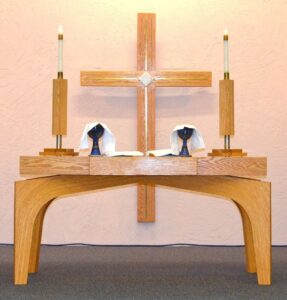
Lying in bed my first night of college, I reflected on the day: men in skirts had kindly helped my folks and me move in, the lunch included vegan options, streakers paraded past my dorm after our RA meeting, and there was a party where all sorts of things I’d never smelled or tasted before were passed around to the background of a constant flow of ’60s music. Even the survey that the RAs read during orientation still had my mind buzzing. Fifteen out of 20 of the RAs had experimented with drugs in their first month at the school, 13 out of 20 had questioned their sexuality in their first year, and all had changed majors once.
The next afternoon I met my faculty advisor, a rabbi with a PhD from the University of Pennsylvania. She walked me through the course selection process and helped me set life and study goals that would amount to the terms of my first contract. At this school, a student is expected to set regular goals and those goals go under review at the end of each term. When selecting colleges, this, along with the small class sizes, drew me in. But it wasn’t my main goal. I came to New College of Florida, a school renowned for its liberal staff and students, to be an evangelical apologist.
I read Derek Black’s story recently. He is the white supremacist who was changed by an invitation to a shabbat meal. While I did not know him personally, Black and I attended New College at the same time, and I remember the student forum posts when it was revealed that he was associated with the White Supremacist movement. The Washington Post article told me the continuation of his story, and I found it similar to mine. Black, like me, is a person who had been truly changed by New College.
In the months that followed my orientation week at New College, I joined a small Methodist Church, led some Bible studies in the ironically named Jesus Club on campus, became an interim youth pastor at a Korean church, and tried to work with other college ministries in the city. The classes, conversations, meetings, and parties at this liberal school were just too much, too different, for me. So I dove headfirst into any element of normal and same that I could find—the church.
At first, every class was a letdown. I took Christian Scriptures thinking I’d rock it and have several opportunities to share my faith. Instead, everyone knew more than I did, the texts were about feminist readings of Paul and corruption in the dating and authorship of the Gospels. We read Gnostic documents and extra-biblical sources that showed the variety of Christianities present in the Late Antiquity world. I was frequently proven wrong in class. I took a Dead Sea Scrolls seminar and read books about Messianic prophecies, but none of them looked like Jesus. In a class on ancient novels later that year I discovered dozens of people claiming to be Messiahs running around the Middle East.
Derek’s story tells of a Shabbatluck dinner, which I attended occasionally. Although I didn’t meet Derek there, most of the group was non-religious. There seemed to be more spirituality on this campus of atheists and agnostics than there was in my circle of Christian friends back home. I learned about Eastern religions, meditation, yoga, and shamanism. Some of the people in my building spoke of nature as a living being with personality, intuition, and power. Others told me about how psychedelic mushrooms, certain beverages, marijuana, and similar substances brought them closer to the divine and to a greater knowledge of themselves. All were people with a story and all passionate to find truth, even if in some unconventional ways.
There seemed to be more spirituality on this campus of atheists and agnostics than there was in my circle of Christian friends back home.
Beyond religion and spirituality, I was introduced to an entire world of topics I’d never considered. I learned about white privilege and racism. I learned that I wasn’t the minority, contrary to what I’d been told growing up. To my dismay, I learned that my country was primarily controlled by white Protestant men and not by the liberal media or the atheists.
As an evangelical at New College, I wasn’t viewed as a minority. I was simply an individual among many. There were World of Warcraft players, skateboarders, Manga readers, and amateur novelists. There were the Anarchist Deathsticks knitting club, the Culture and Diversity Room clubs, week-long Zombie games, Naked Potlucks, Greek tragedy readings, Drone Meditation, and all manner of strange classes and projects. Everyone belonged to a community, and all were accepted. Even Derek Black. Even me. I was listened to and respected.
All of the groups and people had one thing in common: They passionately fought for what they believed in. As iron sharpens iron, they invited each other into dialogue and worked to learn and grow. They criticized and critiqued, but always with an eye towards progress.
The community converted me. From an apologist, to a dialoguer. From a critic to an activist. My experience at New College made me aware of a world outside my own. I learned about the frequency with which women face sexual assault, the rights and plight of undocumented workers, and was exposed to various other peoples and cultures. New College made me acknowledge my own biases and “isms.” The community there awakened me to the history and effect of privilege. New College helped this evangelical Christian learn how to love and how to be loved.
I had to learn and am still learning that my Christianity as I had come to know it was, in part, a product of a narrative written by the victors; much of what I believed and held dear was not truly Christian or truly Jesus. Why was my Jesus and church white, my God and pastors male, my youth experiences charged with a heteronormative punch of sexuality, my friends all Republican, and my understanding of my Bible and church history so spotty and one-sided?
The spirit of dialogue and common humanity nurtured at New College forced me to ask—and answer—these questions.
You don’t have to attend New College to experience this change. We can put ourselves in positions where we encounter our “others”—people who believe and live and act differently than we do. We can intentionally create our gathering spaces, whether they be churches or homes or communities, to be places that encourage dialogue and neighbor-love. We can live out the kingdom of God where we love both neighbor and enemy.
We can intentionally create our gathering spaces, whether they be churches or homes or communities to be places that encourage dialogue and neighbor-love. We can live out the kingdom of God where we love both neighbor and enemy.
I hope that more and more Christians will be brave enough to question our privileges and be open to the views of the others in our midst. I pray that we’ll take privilege and bias seriously, taking every thought and intention captive. That we’ll build dialogue and openness into our communities. That we’ll put ourselves in positions to build community with those who will challenge and stretch us. That we’ll listen first and that we’ll be willing to be changed. I hope we can all learn to be New College Christians.
Troy Konicki was a religion student at New College of Florida and later a student at Palmer Seminary where he was an intern with Christians for Social Action. He now lives and teaches in China.


